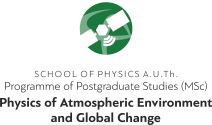
Melas Dimitrios
Professor
School of Physics, Aristotle University of Thessaloniki
Laboratory of Atmospheric Physics, Faculty of Sciences building, 2nd floor
Dr. Dimitris Melas was born in 1958 in Thessaloniki. He graduated from the Department of Physics of the University of Ioannina in 1982 and received a BSc in Meteorology (1984) and a PhD (1990) from the University of Uppsala, Sweden. He is Professor of Environmental Physics at the Physics Department of the Aristotle University of Thessaloniki and coordinator of the interdisciplinary group “Atmospheric Monitoring and Modeling Services (ATMOS)” of the AUTH Interdisciplinary Research and Innovation Center (KEDEK).
He has previously taught at the University of Uppsala and the University of the Aegean, while since 1993 he has been teaching in the Graduate Program of Environmental Physics and since 1999 in the undergraduate program of the Department of Physics of AUTH, courses on Environmental Physics, Atmospheric Physics and Computational Physics.
He has been director of the Department of Applied Physics and Environmental Physics (2011-2013), director of the Graduate Program in Environmental Physics, (2015-2019) and Head of the Department of Physics (2020-2022)
His main academic and professional activities include Air Quality Modelling, Air Quality Monitoring and Assessment in Regional and Urban Scale, Urban and Regional Climate, Mesoscale Meteorological Modeling and Boundary Layer Meteorology. He has participated in more than 70 international or national research projects, while he was coordinator or principal investigator in 40 of them. He has published three books in the Greek or international literature, more than 160 papers in peer-reviewed international scientific journals and more than 125 publications in the proceedings of international or Greek peer-reviewed conferences. His scientific work has received more than 5000 citations according to the SCOPUS database.
COURSES TAUGHT
1. Quality of the atmospheric environment
2. Environmental Management and Circular Economy
3. Air Quality Models
4. Atmospheric circulation models


